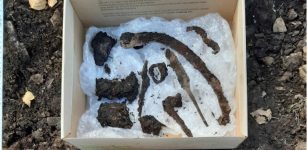Rare Ancient Human Footprints Found On Gower Peninsula, Wales Are 7,000 Years Old
AncientPages.com - Rare ancient human footprints discovered on the Welsh coastline are 7,000 years old, say Cardiff University researchers.
The ancient footprints of both children and adults, discovered at Port Eynon on the Gower Peninsula in 2014, were primarily dated to the Bronze Age.
Recent radiocarbon dating carried out by archaeology PhD student Rhiannon Philp at Cardiff University, has revealed that they are 3,000 years older than previously thought.

The ancient footprints found at Port Eynon on the Gower peninsula (Photo: Cardiff University/PA Wire
The fragile footprints originate from the Mesolithic period, a time when humans were predominantly hunting and gathering.
“These ‘frozen’ footprints made in freshwater marshland give us a fleeting glance of a group of adults and children travelling together seven millennia ago,” said Ms Philp.

Cardiff University researcher pushes our understanding of a set of rare human footprints on the Welsh coast back by 3,000 years. Image credit: Cardiff University
“But the picture is even more precise. Wild animal tracks suggest deer and wild boar moving in the same direction,” she said, “and what we might be witnessing 7,000 years later is a snapshot moment of a Mesolithic hunting party tracking their prey through an open, boggy landscape now lost to the waves.”
See also:
Din Lligwy: Celtic Settlement In Isolated Woodland Of Anglesey, Wales
Llangernyw Yew: Chilling Prophecy Of The Oldest Tree In Wales
Conwy Castle In Snowdonia: Outstanding Medieval Fortification In Europe
Ancient Lost City Of Trellech Discovered On English-Welsh Border
Owain Glyndwr: Famous Medieval Welsh Warrior Prince And Symbol Of Independence
Researchers say that post-Ice Age human footprints were rare in the UK, with only nine recorded intertidal sites, the majority of which are in Wales.
Ms Philp added: “Given the fragility of these examples and climate change now and then, it is incredibly important to obtain as much information as possible whenever the opportunity arises.”
Further research will help to understand the ancient environment and the people who lived during the Mesolithic period.
AncientPages.com




















